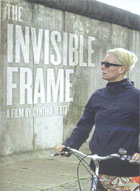
The Invisible Frame 2009
Distributed by Icarus Films, 32 Court St., 21st Floor, Brooklyn, NY 11201; 800-876-1710
Produced by Frieder Schlaich
Directed by Cynthia Beatt
DVD, color, 60 min.
High School - General Adult
European Studies, Political Science, World War II
Date Entered: 07/08/2011
Reviewed by Rebecca Adler Schiff, College of Staten Island, City University of New YorkIn 1988, one year before its collapse, director Cynthia Beatt and a young Tilda Swinton made a film about the Berlin Wall, Cycling the Frame. Twenty-one years later, in The Invisible Frame, filmmaker and actor return to the scene, long after the city has been integrated and only fragments of the wall, some memorials, a watchtower or two, and graffiti scribbled in rainbow colors on the walls of some abandoned buildings, glass shards in the windows, remain. Otherwise Berlin appears to be, except at its center, a rather attractive bucolic city, with Berliners moving at a patient pace and with greenery everywhere, a river and a lake easily within or just outside city limits. Indeed there are times that Swinton passes by walls that seem now to be part of the suburban landscape, leaving one to ask getting no help from the film whether we’re looking at remnants of the infamous one or not. Without any kind of narration, though, the film’s focus rests on Swinton as she pedals along, stopping here and there, starting up again at seemingly another place, at times pedaling left on the screen, then right, strolling briefly on foot, lying in a grassy park, reciting on the sound track poems by Yeats, Akhmatova, and fellow Scot Robert Louis Stevenson. Some encounters with people along the way seem improvised, others planned. And then there are the pretentious, simplistic, tendentious sentences uttered by Swinton throughout the film, the gist of which is to solemnly declare that Something there is that doesn’t like a wall! In the somewhat abstract framework of the film and of bitter history itself, Swinton’s remarks are so simplistic and so empty of context as to be profoundly … superficial! One longs long before the film comes to an end at the famous Brandenburg Gate to have been watching instead a pedestrian documentary that would have related in a straightforward manner the actual story of the Berlin Wall – what a valuable lesson that would have provided, in place of the present film’s portentous posturing.